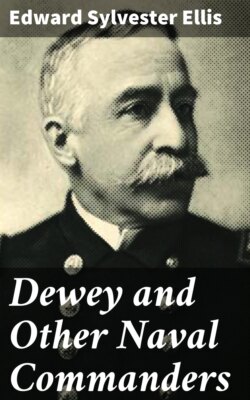Читать книгу Dewey and Other Naval Commanders - Edward Sylvester Ellis - Страница 8
На сайте Литреса книга снята с продажи.
ОглавлениеGUNBOATS PASSING BEFORE VICKSBURG.
The latter surrendered to General Grant July 4, 1863, and the river was opened from its source to the Gulf. Early in 1864 the lieutenant was made executive officer of the gunboat Agawam, and when attached to the North Atlantic squadron, took part in the attack on Fort Fisher, one of the strongest of forts, which, standing at the entrance of Cape Fear river, was so efficient a protection to Wilmington that the city became the chief port in the Confederacy for blockade runners. Indeed, its blockade was a nullity, despite the most determined efforts of the Union fleet to keep it closed. The Confederate cruisers advertised their regular days for departure, and they ran upon schedule time, even women and children taking passage upon the swift steamers with scarcely a fear that they would not be able to steam in and out of the river whenever the navigators of the craft chose to do so.
The first attempt against Fort Fisher was in the latter part of December, 1864, but, though the fleet was numerous and powerful, and the greatest gallantry was displayed, the attack was unsuccessful. General Butler, in command of the land troops, after a careful examination of the Confederate works, pronounced capture impossible and refused to sacrifice his men in a useless attack. Nevertheless the attempt was renewed January 12, when General Alfred Terry had charge of the land forces. The garrison made one of the bravest defences of the whole war, and the hand-to-hand fight was of the most furious character. It lasted for five hours, when the fort was obliged to surrender, the garrison of 2,300 men becoming prisoners of war. It was in this fearful struggle that Ensign "Bob" Evans, who was with the naval force that charged up the unprotected beach, was so frightfully wounded that it was believed he could not live. When the surgeon made ready to amputate his shattered leg, Bob, who had secured possession of a loaded revolver, swore he would shoot any man who touched the limb with such purpose. Perforce he was left alone, and in due time fully recovered, though lamed for life.
Lieutenant Dewey was one of the most active of the young officers in the attack on Fort Fisher, and conducted himself with so much bravery and skill, executing one of the most difficult and dangerous movements in the heat of the conflict, that he was highly complimented by his superior officers.
But peace soon came, and a generation was to pass before his name was again associated with naval exploits. In March, 1865, he was promoted to the rank of lieutenant-commander and assigned to duty on the Kearsarge, the vessel that acquired undying glory for sinking the Alabama, off Cherbourg, France, during the previous July. Early in 1867 he was ordered home from the European station and assigned to duty at the Kittery Navy Yard, at Portsmouth, New Hampshire.
While at this station he became acquainted with Miss Susan B. Goodwin, daughter of the "war Governor" of New Hampshire. She was an accomplished young woman, to whom the naval officer was married, October 24, 1867. Their all too brief wedded life was ideally happy, but she died December 28, 1872, a few days after the birth of a son, named George Goodwin, in honor of his grandfather.
From 1873 to 1876 Dewey was engaged in making surveys on the Pacific coast; he commanded the Juniata on the Asiatic squadron in 1882–83, and the following year was made captain and placed in charge of the Dolphin, one of the original "white squadron." Next came service in Washington as Chief of the Bureau of Equipment and Recruiting, as member of the Lighthouse Board and president of the Board of Inspection and Survey (he being made commodore February 28, 1896), until 1897, when he was placed in command of the Asiatic squadron, much against his will.
